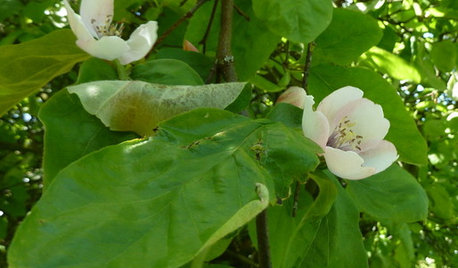Question re: Preserving nutrients in sprouts
esoterica
18 years ago
Related Stories

GARDENING GUIDESPacific Northwest Gardener's November Checklist
Set a festive mood with a container garden while preserving and protecting your landscape and water features
Full Story
GREEN BUILDING6 Green-Roof Myths, Busted
Leaky, costly, a pain to maintain ... nope, nope and nope. Get the truth about living roofs and see examples from simple to elaborate
Full Story
EDIBLE GARDENSWhy Grow Quince? For Beauty, Fragrance and Old-Time Flavor
Delightfully perfumed fruit and lovely spring blossoms make this apple and pear cousin worth a spot in the garden
Full Story
LANDSCAPE DESIGNGreat Design Plant: Quaking Aspen for 3-Season Beauty — on Its Own Turf
It offers bright fall foliage, snowy winter bark and lush green leaves in summer. Just don't try to plant quaking aspen away from its home
Full Story
CONTEMPORARY HOMESHouzz Tour: Curves Ahoy! See a Unique Floating Home
It appeared on ‘Portlandia,’ but it doesn’t take a camera crew to see how special this home on a river is
Full Story
GARDENING GUIDESGet on a Composting Kick (Hello, Free Fertilizer!)
Quit shelling out for pricey substitutes that aren’t even as good. Here’s how to give your soil the best while lightening your trash load
Full Story
EDIBLE GARDENSHow to Grow 10 Favorite Fruit Trees at Home
Plant a mini orchard in fall, winter or early spring to enjoy fresh-off-the-tree fruit the following year
Full Story
FALL GARDENING6 Trees You'll Fall For
Don’t put down that spade! Autumn is the perfect time for planting these trees
Full Story
EDIBLE GARDENSSummer Crops: How to Grow Tomatoes
Plant tomato seedlings in spring for one of the best tastes of summer, fresh from your backyard
Full Story
GARDENING AND LANDSCAPINGChoosing a Deck: Plastic or Wood?
Get the pros and cons of wood, plastic, composite and more decking materials, plus a basic price comparison
Full StoryMore Discussions


Heathen1
esotericaOriginal Author
Related Professionals
Camas Landscape Architects & Landscape Designers · Parole Landscape Architects & Landscape Designers · Ellicott City Landscape Contractors · Fort Payne Landscape Contractors · Hilton Head Island Landscape Contractors · Homewood Landscape Contractors · Metairie Landscape Contractors · Lexington Carpenters · Plainfield Carpenters · Anderson Roofing & Gutters · Hicksville Roofing & Gutters · Pittsburgh Roofing & Gutters · West Chester Roofing & Gutters · Robbinsdale Roofing & Gutters · SeaTac Roofing & GuttersHeathen1